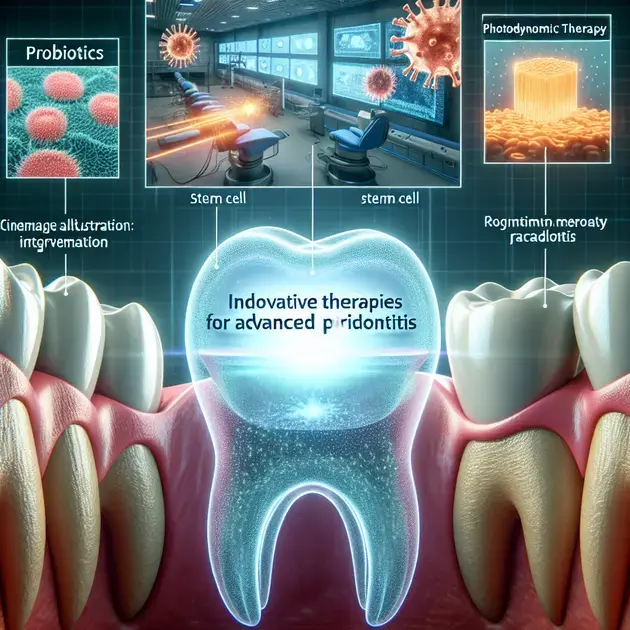When it comes to managing periodontitis, exploring medication options is essential. Understanding the available treatments can make a significant difference in your oral health journey. In this article, we will delve into the various medication options for periodontitis and what you need to know to make informed decisions.
From antibiotics to antimicrobial mouth rinses, the world of periodontitis medication is diverse and continuously evolving. It’s crucial to stay informed about the latest advancements and treatment approaches to ensure the best possible outcomes for your oral health. Let’s explore the ins and outs of medication options for periodontitis together.

Understanding Antibiotics for Periodontitis
When dealing with periodontitis, antibiotics can be a crucial component of the treatment plan. Understanding how antibiotics work and when they are prescribed can help improve the effectiveness of the treatment. One common antibiotic prescribed for periodontitis is doxycycline. This medication helps to reduce inflammation and fight the bacteria causing the infection.
To understand how antibiotics are used for periodontitis, it is essential to consult with a dentist or periodontist. They will evaluate the severity of the infection and determine if antibiotics are necessary. Additionally, they will provide a specific dosage and duration for the antibiotic treatment.
Patients can find information on antibiotics for periodontitis on reputable medical websites such as WebMD or may consult with the American Academy of Periodontology’s official website for guidelines on antibiotic use in periodontal treatment.
It is important to follow the prescribed antibiotic regimen diligently. Missing doses or stopping the medication prematurely can lead to antibiotic resistance and reduced effectiveness in treating periodontitis. Always consult with a healthcare professional before starting any antibiotic treatment.
By understanding the role of antibiotics in treating periodontitis and following the prescribed guidelines, patients can improve their oral health and combat the infection effectively.
Exploring Antimicrobial Mouth Rinses
Antimicrobial mouth rinses are a valuable addition to oral hygiene routines, especially for individuals with periodontitis. These mouth rinses contain active ingredients that help reduce bacteria in the mouth, promoting gum health and preventing infections.
When exploring antimicrobial mouth rinses, look for products that are specifically designed for periodontal care. Brands like Listerine and Crest offer antimicrobial mouth rinses that are clinically proven to reduce plaque and gingivitis.
Using an antimicrobial mouth rinse is simple. After brushing and flossing, measure the recommended amount of mouthwash and rinse it around the mouth for the specified duration. Spit out the mouthwash and avoid eating or drinking for at least 30 minutes.
For more information on antimicrobial mouth rinses, consumers can visit the official websites of leading oral care brands or consult with a dentist for personalized recommendations. Additionally, reputable health websites like Healthline provide insights into the benefits and proper use of antimicrobial mouth rinses.
Incorporating an antimicrobial mouth rinse into daily oral care routine can help individuals with periodontitis maintain a healthy mouth and prevent further progression of the disease.
Latest Advancements in Periodontitis Medication
With ongoing research and development in the field of periodontal care, new advancements in medication for treating periodontitis continue to emerge. These innovative treatments offer improved efficacy and patient outcomes compared to traditional methods.
One notable advancement in periodontitis medication is the use of local antibiotic delivery systems. Products like Arestin utilize microspheres to deliver antibiotics directly to the infected gum pockets, targeting the bacteria more effectively.
Patients can learn about the latest advancements in periodontitis medication through dental journals, scientific publications, and updates from dental conferences. Websites like Dentistry Today provide insights into emerging treatments and medications in the field of periodontal care.
Consulting with a periodontist who stays updated on the latest advancements in periodontitis medication is crucial for receiving the most effective treatment. These specialists can recommend innovative therapies that align with individual patient needs and provide optimal results.
By staying informed about the latest advancements in periodontitis medication and working closely with knowledgeable healthcare providers, patients can access cutting-edge treatments that enhance the management of this chronic oral infection.

Effective Treatment Options for Periodontitis
Periodontitis is a serious gum infection that damages the soft tissue and destroys the bone that supports your teeth. It can lead to tooth loss if left untreated. Fortunately, there are effective treatment options available to help manage and control periodontitis. One common treatment is scaling and root planing, where the dentist removes plaque and tartar from the teeth and root surfaces. This helps reduce inflammation and allows the gums to heal.
Another treatment option for periodontitis is the use of antibiotics. Antibiotics can be taken orally or applied directly to the infected areas to help eliminate the bacteria causing the infection. In more severe cases, surgery may be necessary to clean the roots of the teeth and repair the damaged tissue. This can help prevent further bone loss and ultimately save the affected teeth.
It’s important to note that maintaining good oral hygiene practices at home is essential for managing periodontitis. This includes brushing and flossing regularly, using an antiseptic mouthwash, and attending regular dental check-ups. In some cases, lifestyle changes such as quitting smoking and managing stress can also help improve the outcome of treatment.
Comparing Traditional and Advanced Periodontitis Medications
When it comes to treating periodontitis, there are both traditional and advanced medication options available. Traditional medications typically include antibiotics and antimicrobial mouth rinses to help kill the bacteria causing the infection. These medications have been used for years and are effective in controlling periodontal disease.
On the other hand, advanced medications for periodontitis may include targeted drug delivery systems that allow for precise application of medication to the affected areas. This can help minimize side effects and improve the effectiveness of the treatment. Advanced medications may also involve the use of enzyme suppressants or host modulation therapy to help regulate the body’s immune response and reduce inflammation.
It’s important to consult with your dentist or periodontist to determine the most appropriate medication for your specific condition. They can evaluate the severity of your periodontitis and recommend a treatment plan that may include a combination of traditional and advanced medications to achieve the best results.
Innovative Approaches to Periodontitis Medication
As research in periodontal disease continues to advance, new innovative approaches to medication have emerged. One promising approach is the development of probiotics specifically designed to promote healthy oral bacteria and reduce the growth of harmful bacteria that cause periodontitis. By balancing the oral microbiome, probiotics may help prevent and manage gum disease.
Another innovative approach to periodontitis medication is the use of photodynamic therapy, where a special light is used to activate a photosensitive drug applied to the infected gums. This therapy helps eliminate bacteria and reduce inflammation, promoting healing and tissue regeneration. Photodynamic therapy is minimally invasive and can be an effective treatment option for certain cases of periodontitis.
Stem cell therapy is also being explored as a potential treatment for periodontitis. By using stem cells to regenerate damaged tissues and bone, this therapy has the potential to restore the health of the gums and supporting structures in the mouth. While still in the early stages of research, stem cell therapy shows promise as a future treatment option for periodontitis.
Conclusion
In conclusion, periodontitis is a severe gum infection that can lead to tooth loss if left untreated. Fortunately, there are effective treatment options available including scaling and root planing, antibiotic therapy, and in severe cases, surgery. These treatments aim to reduce inflammation and prevent further bone loss, ultimately saving the affected teeth.
When comparing traditional and advanced medications for periodontitis, it’s important to consult with dental professionals to determine the most suitable option. Traditional medications like antibiotics and mouth rinses are effective in controlling the disease, while advanced options such as targeted drug delivery systems and host modulation therapy can minimize side effects and enhance treatment outcomes.
Furthermore, innovative approaches to periodontitis medication show promise in the field. Probiotics designed to balance the oral microbiome offer potential benefits in preventing and managing gum disease. Additionally, photodynamic therapy and stem cell therapy present new avenues for eliminating bacteria, reducing inflammation, and regenerating damaged tissues, indicating exciting possibilities for future treatment methods.



